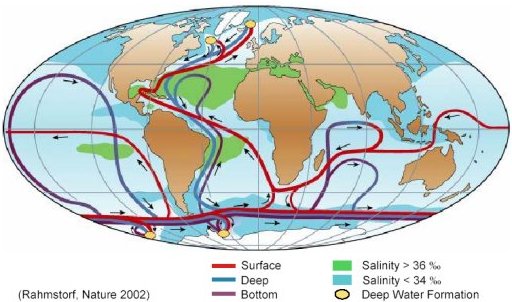Strong Current Warning
Posted by Big Gav in global warming, ocean currents
The Daily Telegraph (not one of my usual sources for science news, but whatever) reports that deep Antarctic waters are freshening, prompting concerns about sudden shifts in ocean current circulation.
For background reading check out Stefan Rahmstorf's site on Thermohaline Ocean Circulation and these links on the Antarctic Circumpolar Current.
SCIENTISTS studying the icy depths of the sea around Antarctica have detected changes in salinity that could have profound effects on the world's climate and ocean currents.
The scientists returned to Hobart on Thursday after a one-month voyage studying the Southern Ocean to see how it is changing and what those changes might mean for global climate patterns.
Voyage leader Steve Rintoul said his team found that salty, dense water that sinks near the edge of Antarctica to the bottom of the ocean about 5 km down was becoming fresher and more buoyant.
So-called Antarctic bottom water helps power the great ocean conveyor belt, a system of currents spanning the Southern, Pacific, Indian and Atlantic Oceans that shifts heat around the globe.
"The main reason we're paying attention to this is because it is one of the switches in the climate system and we need to know if we are about to flip that switch or not,'' said Rintoul of Australia's government-backed research arm the CSIRO.
"If that freshening trend continues for long enough, eventually the water near Antarctica would be too light, too buoyant to sink and that limb of the global-scale circulation would shut down,'' he said on Friday.
Cold, salty water also sinks to the depths in the far north Atlantic Ocean near Greenland and, together with the vast amount of water that sinks off Antarctica, this drives the ocean conveyor belt.
This system brings warm water into the far north Atlantic, making Europe warmer than it would otherwise be, and also drives the large flow of upper ocean water from the tropical Pacific to the Indian Ocean through the Indonesia Archipelago.
If these currents were to slow or stop, the world's climate would eventually be thrown into chaos.
"We don't see any evidence yet that the amount of bottom water that's sinking has declined. But by becoming fresher and less dense it's moving in the direction of an ultimate shutdown.''







